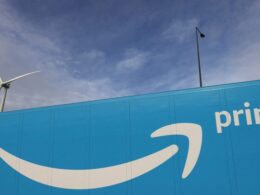Unlock the Editor’s Digest for free
Roula Khalaf, Editor of the FT, selects her favourite stories in this weekly newsletter.
Pop star Katy Perry returned to Earth from her short trip aboard a Blue Origin rocket with a message for humanity: “I hope they can see the unity that we modelled and replicate that,” she told the audience at a post flight news conference last week. “You’ll never know the amount of love that you have inside of you to give and to receive until the day you launch.”
That love has not been reciprocated by the public. As an advert for commercial space endeavour, Blue Origin’s first all-female flight missed the mark. The group’s skintight suits have received more attention than their girlboss slogan “taking up space!” And while some of the mockery can be chalked up to misogyny (no one complained when William Shatner took a rocket trip) the spectacle of extravagance has been jarring for a country braced for recession.
For Jeff Bezos the backlash raises a dilemma. His private company is committed to pursuing space tourism. The success of Blue Origin will have a knock on effect for his ecommerce company Amazon too. Yet any reminder of the costs involved — both dollar and environmental — seems to trigger public disapproval.
Unfortunately for Bezos, this is a long-standing problem for space investment. Consider the speedy decline of Nasa’s Apollo mission. In 1969, Neil Armstrong was watched by over 600mn people as he became the first man to walk on the moon. By 1972 the mission was over. Interest in spending the amounts required had plummeted. Astronaut Alan Shepard’s stunt hitting golf balls on the moon may have had something to do with that. As journalist Andrew Smith wrote in Moondust, scientists at the agency complained that it was wasting its time.
Rocket launches are now a private sector race between billionaires who can write their own cheques. If Bezos wants to send celebrities into space he is free to do so — even if it fails to ignite excitement about the prospect of routine space travel or business parks floating hundreds of miles above Earth.
But suborbital space tourism is not the only business that Blue Origin is in. It is also developing heavy duty rocket New Glenn for orbital launches.
This connects Blue Origin to Amazon. Although Bezos stepped down as Amazon chief executive in 2021 to focus on Blue Origin, he remains executive chair and has entwined the fortunes of the two companies. Dave Limp, a former senior Amazon executive, is Blue Origin’s chief executive. And Blue Origin’s rockets could be key to Amazon’s $10bn Project Kuiper, a scheme to beam high speed satellite internet connection around the world. Amazon hopes the service, a rival to SpaceX’s Starlink, could one day become its longed for ‘fourth pillar’ — a business able to equal the success of online retail, Prime membership and Amazon Web Services’s cloud computing.
While Elon Musk’s $350bn SpaceX dominates orbital launches and Amazon plans to send up its first non-prototype satellites later this month on a rocket made by United Launch Alliance — a joint launch service from Boeing and Lockheed Martin — it could one day use New Glenn.
Successful rockets that can be reused and carry heavy payloads (and people) will also create the infrastructure for other space start-ups. Seattle based Interlune, for example, wants to launch moon mining missions. And AstroForge, an aerospace company based in Huntington Beach, California, hopes to mine 2022 OB5, a small asteroid close to Earth that could be metallic. Global space tech investments rose 25 per cent last year, according to UK-based investment group Seraphim Capital, reaching $8.6bn.
Investment in rockets able to carry satellites does not depend on space tourism. But Blue Origin and SpaceX still rely on contracts with the national space agency and other governments. So public support for space exploration carries weight. Nasa’s budget was $24.9bn last year, less than the agency requested. Despite US President Donald Trump declaring that he wants astronauts to plant the American flag on Mars, the White House is proposing an even lower budget this year of around $20bn.
When it comes to space, the public seems to prefer science to stunts. The last time the Pew Research Center asked American adults what they thought Nasa’s top priority should be, the majority said monitoring calamitous asteroids and keeping Earth safe. Sending humans into space came at the very bottom of the list. Sending pop stars didn’t feature at all.
elaine.moore@ft.com
Source link









